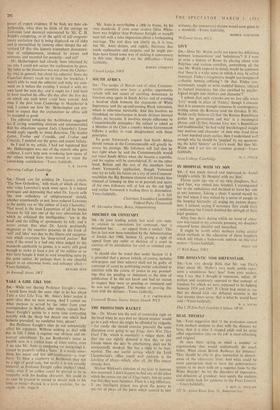SIR. - -Dr. Moore hits the nail of censorship right
on the head when he says that no 'decent woman' would go to a pub where she might be offended by vulgarity --for surely she should exercise precisely the same discretion over going to sec Fings Ain't Wot They Used T'Be, which is essentially a vulgar show. All that she can rightly demand is that she, or any friends whom she may be entertaining, shall not be unexpectedly shocked. Shc has a right to be fore- warned. The one useful service which the Lord Chamberlain's office could well perform is the labelling of plays—which, after all, the film censor already does.
Marion Wickson's criticism of my taste in humour was unearned. I don't happen to find any of the jokes which the censor cut out of Fings funny, but my point was that they were harMless.There is a big difference. If any intelligent person was given the power 'to cut out of plays all the jokes which seemed to him unfunny, the commercial theatre would soon grind to a standstill.—Yours faithfully,
RAMER GASCOIGNE
99 Gower Street, WC! LIVY SIR,—Does Mr. Walsh really not know the difference between 'conscientious' and 'industrious'? If I were to write a history of Rome by playing about with Polybius and various -annalists, committing all the sins Mr. Walsh exposed in detail, would he comment that 'there is a wider sense in which it may be called historical. Finley's imaginative insight has recaptured authentic human .suffering'? Or that 'Finley con- scientiously sought to write truthful history, vitiated by factual inaccuracy but also enriched by psycho- logical insight into motives and character'?
I submit that such remarks are no less silly when 'Livy' stands in place of 'Finley,' though 1 concede that it is common enough nonsense in contemporary Writing about the Romans (and the Greeks). if Mr. Walsh really believes (1) that 'the Roman Republican genius for government and war' is a meaningful phrase, and (2) that, because Livy was 'a Republican and traditionalist,' he had valid 'psychological insight into motives and character' of men who lived three or four hundred ,years earlier, then I understand well enough why he should be 'puzzled' by my question- ing the label 'history' on "ivy's work. But then Mr. Walsh and I are not on common ground.—Yours faithfully,






































 Previous page
Previous page